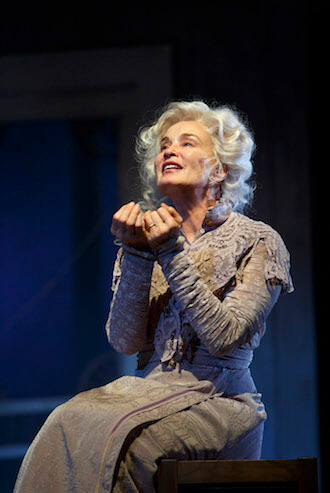BY CHRISTOPHER BYRNE | For those of us with Irish ancestry, “The Quare Land,” now getting a marvelously entertaining production at the Irish Rep, is a hilariously extreme version of what might seem only too familiar — long-held resentments, intractable opinions, and a keen eye for taking advantage of others. Perhaps that’s too simplistic, but watching this play I could hear echoes of my grandparents’ generation, whose parents arrived in the US from Ireland and whose pride in their heritage never dimmed. Nor did their bickering, banter, and bluster, which dominated every family event. My young brothers and I were wonderfully entertained; our parents and their generation, not so much.
The story concerns 90-year-old Hugh Pugh, who is taking his first bath in four years. Rather than get out of the tub, he has Rob McNulty come visit him in his down-at-heels bathroom. Rob has come hoping Hugh will sell him a patch of land so he can develop it. What seems like a simple enough transaction becomes a battle of wills. Hugh has a thousand stories, and Rob has a meeting he has to get to. The set-up, of course, is obvious and familiar, but John McManus’ script is full of twists and turns, alternating bouts of frustration and charm. It’s not realistic to be sure, but it sure is fun.
Landscapes more barren in “Spring Awakening,” “Fondly, Collette Richland”
The fun also comes from the outstanding performances by Peter Maloney as Hugh and Rufus Collins as Rob. With flawless comic timing and a go-for-broke energy, under the direction of Ciarán O’Reilly, this tale of what my grandmother used to call “the immovable object meets the irresistible force” –– in reference to our own family battles –– is just plain irresistible.
“Spring Awakening” is a polarizing show that took Broadway by storm in 2006. It struck a nerve, as it intended to, with its themes of repression, ignorance, and adolescent angst. While it is set in 19th century Germany, the story of teenage torment and the conflict between human nature — both biological and emotional — and a reactionary society had contemporary resonance. That resonance is even more pronounced a decade later as the media is suffused with the idiotic maunderings of Mike Huckabee, Kim Davis, and all the other militant moralists lusting to impose their religious beliefs on the culture at large.
The show, with a book by Steven Sater and music by Duncan Sheik, mixed classic and contemporary idioms to reinforce its central themes. The original production, with groundbreaking choreography by Bill T. Jones, presented the story’s race of unsettling, exuberant, and tragic developments as if they were a hormonal teenager’s mood swings. The effect was theatrically historic.
While Deaf West Theatre deserves a lot of credit for mounting the current revival and there is nobility in having deaf and hearing actors double up on the major roles, the execution here undermines the passion and inherent excitement of the piece. There are all sorts of reasons why the underlying concept is a valid one. For instance, the physical poetry of the sign language could be a metaphor for strained inter-generational communication. And the doubling of roles mirrors the outward and inward conflicts of the characters.
These rationales, compelling as they may be, can’t compensate for a flat and baffling production. No matter how much director Michael Arden tries to distinguish between the hearing and singing actors by keeping the doubles in shadow, the device is used inconsistently, bogs down the entire enterprise, and tamps down any edge or urgency that drives the characters. This is a show that needs to be over-the-top to achieve its more expressionistic moments, but the need to split the focus of the audience and communicate in two styles renders the production measured and careful, qualities “Spring Awakening” cannot embody if it is to succeed.
On the positive side, it’s nice to be reminded what a powerful score this is and to hear it in a big Broadway house. The cast includes veterans Camryn Manheim and Marlee Matlin in the older female roles, and both are terrific. Patrick Page, fresh from his wonderful performance in “Cymbeline,” is also outstanding, as is Russell Harvard, who was so revelatory in “Tribes” several seasons ago.
I didn’t become a full-fledged fan of this show until I saw a stripped down version in a regional theater in Dallas, where the music and the youthful energy of the performers drove the production. The conflict between cultural pressure and the awakening of the characters was profoundly moving and galvanizing. In the current production, the effect is quite the opposite, inspiring nothing as much as an autumnal nap.
I’m not much given to prayer, but please God spare me from another evening as insufferable and pretentious as “Fondly, Collette Richland,” now at New York Theatre Workshop. This assiduously obscure and seemingly endless piece is worse in that it is completely unoriginal. Playwright Sibyl Kempson has lifted from a long list of writers from the Dadaists to the Off-Off Broadway movement of the 1960s. There are purloined bits from Tristan Tzara and Charles Dizenzo, who may be unknown to many, and there’s even some early Edward Albee tossed in to portray the constricting shallowness of domestic routine. But if this is theatrical deconstruction or social commentary or even a play at all, it lacks artistic vision or any kind of coherence, instead merely rambling aimlessly in a series of tenuously connected scenes that revel in their studied, solipsistic nonsense.
And that goes for the actors, too. This nearly three-hour mess has been foisted on the theatergoing public by director John Collins and the company known as Elevator Repair Service. Roughly half the audience repaired to other more interesting pursuits at the intermission. Lucky devils.
THE QUARE LAND | DR2 Theatre, 103 E. 15th St. | Through Nov. 15: Tue., Thu. at 7 p.m.; Wed., Fri.-Sat. at 8 p.m.; Sat.-Sun., Wed. at 3 p.m. | $70 at ovationtix.com or 212-727-2737 | Ninety mins., no intermission
SPRING AWAKENING| Brooks Atkinson Theatre, 256 W. 47th St. | Through Jan. 24: Mon.-Tue., Thu. at 7 p.m.; Fri.-Sat. at 8 p.m.; Sat. at 2 p.m.; Sun. at 3 & 7:30 p.m. | $59-$149 at ticketmaster.com or 800-754-3000 | Two hrs., 15 mins., with intermission
FONDLY, COLLETTE RICHLAND | New York Theatre Workshop, 79 E. Fourth St., btwn. Bowery & Second Ave. | Through Oct. 24: Tue.-Wed., Sun. at 7 p.m.; Thu.-Sat. at 8 p.m.; Sat.-Sun. at 2 p.m. | $65 at nytw.org or 212-460-5475 | Two hrs., 50 mins., with intermission
































